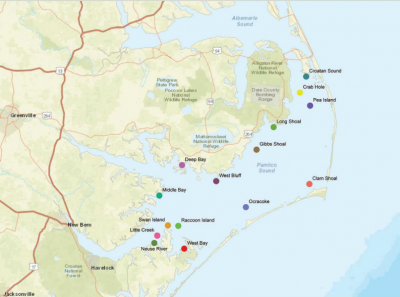
RALEIGH — The three-way negotiation between the House, Senate and Cooper administration hits another milestone this week, with the Senate prepared to vote out its version of the $24 billion, two-year spending plan.
The Senate bill, which was released Tuesday, includes significant differences in funding for environmental programs and Department of Environmental Quality spending plus a number of policy proposals not in either previous plan.
Supporter Spotlight
Among the top differences is spending on research and testing on emerging contaminants, upgrades and additions to DEQ’s main laboratories and several new special provisions, including a review of the recent process for adopting new general permit requirements for animal waste management systems that would delay for a year the implementation of tighter controls for swine, poultry and cattle operations.

DEQ Secretary Michael Regan said the animal waste permit changes in the budget provision delays were not new rules or regulations. He said they are part of the permit-writing process that’s within DEQ’s authority and that the changes, which were the result of discussions with numerous stakeholders and a review of more than 6,500 public comments, would provide more certainty to farmers and communities.
“The Senate’s budget provision, unlike our permit process or even a proposed bill, lacks transparency and justification,” he said.
The Senate also would put on hold policy changes on emerging contaminants along with any increases in spending for DEQ proposed in both the House and governor’s budgets.

At a hearing on the budget Tuesday, Sen. Andy Wells, R-Catawba, said the Senate wants to hold off while the North Carolina Policy Collaboratory completes a statewide study on emerging contaminants.
Supporter Spotlight
Researchers had requested an additional year to compile a report to the legislature. The Senate budget has an additional $1 million for the study, which includes testing of all of the state’s public water supplies for GenX and other emerging contaminants.
A DEQ representative said the Senate is ignoring pressing needs to improve environmental and public health protections.
“Budget are about priorities,” DEQ spokesperson Sharon Martin said in a response to Coastal Review Online. “The Senate budget again does not fund critical needs to protect water quality, public health and the environment.”
Another major policy provision is a rewrite of a bill proposed this year in both the House and Senate to set up a carrot and stick approach to encourage struggling, economically unsustainable water wastewater to merge with larger systems. The budget includes a $17.5 million appropriation for a new Viable Utility Reserve.
Coastal Projects
Oyster sanctuaries, two major land purchases and additional funds for storm repairs are among the coastal items in the Senate plan.

The Jean Preston Oyster Sanctuary Network would receive $1.5 million in funding each year and the North Carolina Coastal Federation would receive $50,000 to conduct a shellfish marketing study.
The plan also includes a transfer of $20 million to the Coastal Storm Damage Mitigation Fund and an additional $50,000 for the state’s Division of Coastal Management to study locations in state waters for dredge spoils.
The state also is providing Audubon Society $4 million in a directed grant for the purchase of Lea Island, one of the state’s only undeveloped barrier islands, located between Figure Eight Island and Topsail Island.
Like the House, the Senate plan also includes $3.3 million for the Bogue Sound Project, a partnership between the Coastal Federation, Carteret County and the U.S. Marine Corps to secure 74 acres on N.C. 24, including 20 acres of undeveloped waterfront on Bogue Sound near the Marine Corps Auxiliary Landing Field Bogue, also known as Bogue Field.
The funding is drawn from a special budget section on disaster funding although, in general, the Senate and House budgets differed widely on disaster spending.
The House budget plan would spend $84.7 million, most of the remaining money set aside last year for hurricane relief, with the bulk of the funds going to grants to local governments for water and sewer infrastructure and an array of resilience programs including some buyout projects.

But at a press conference Tuesday, Senate budget writers said they didn’t want to commit that much of the remaining funds and instead are allocating $47 million mainly for matches for federal recovery grants.
The total includes $1.5 million for stream debris removal, $2 million for a resiliency study, $5 million for repairs at the North Carolina Aquarium At Fort Fisher and $68,000 for the renovation and dredging of Pelletier Creek in Morehead City.
The two chambers are in agreement on funding for the state ports and the Department of Transportation’s Ferry Division.
Both budget plans set aside $11 million to raise the power lines over the Cape Fear River near the Port of Wilmington to accommodate larger vessels; allocate more money for ferry maintenance; and $1 million to lease the M/V Martha’s Vineyard Express passenger ferry for the Hatteras-Ocracoke route because the long-planned new state ferry has had construction delays and won’t be ready until later in the year.







